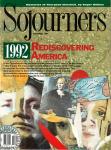In inviting you to read this small tribute to Justice Thurgood Marshall, I should, as he taught me when I was still a law student, disclose my interest in the matter. Simply stated it is this: I have known the Judge for 50 years, and I love him.
Not only have I known Marshall since I was a child; he was the first person who ever paid me to do legal work. It was in the summer of 1955, when the Brown vs. Board of Education desegregation decision was still very new and I had finished my junior year in law school. When I arrived from Ann Arbor, Michigan, at the small suite of offices the NAACP Legal Defense Fund occupied in mid-Manhattan, Marshall put me right to work.
"I want you to write me a memo on the Due Process clause of the 14th Amendment," he said. "I've done a lot of work on Equal Protection, but I need to brush up on Due Process."
For Marshall to ask a law student to help him brush up on an aspect of the 14th Amendment was a little like Magic Johnson asking a high school player for pointers on how to get the ball in to the low post. I shrank at the prospect. But I attacked the project earnestly and finally produced a few pages strung together with what I hoped was passable legal reasoning.
The memo seemed to shriek INADEQUATE as I passed it tremulously across Marshall's desk. I hoped he would bury it in his briefcase. Instead, he took my memo into the little room that served as the library, where most of the lawyers were working. He stood leaning against a doorjamb while he read, and the people paused in their work to watch him. I tried to hide and I wanted to die. Finally Marshall finished.
"Hey y'all," he said in a loud, bearish voice, "this boy ain't as stupid as he looks."
And so I was initiated and welcomed into the civil rights struggle with guffaws and warmth as the big ol' bear strolled back into his lair, grinning broadly and chuckling.
Marshall was the great general of the civil rights legal armies, and warmth and humor were among his most effective tools. He got the most extraordinary efforts out of people because they were devoted to the cause, because they loved him, and because they had the deepest respect for him. He has a brilliant legal mind and the heart of a lion.
In the years before Brown, black people could be lynched in certain parts of the South just for being uppity. And nothing was more uppity than for a colored lawyer to go to meetings to stiffen the resolve of black people to challenge the tyranny they faced, and then to go into court and help them do it. There are certain places in the rural South I don't like to travel today. Marshall traveled those circuits before federal marshals in the South stopped saying nigger in public and before there were television cameras and Northern reporters to spread a patina of protection over civil rights people. It was not that Marshall was impervious to fear. It was simply that he was determined to do the work he had undertaken to do.
MARSHALL'S WORK also required him to be a strategist and a politician. Was integration of schools the appropriate route to take? How should he go for it, incrementally or in big gulps? How much of the NAACP and the rest of the Negro community could he keep marching behind which strategy?
He made his choices, and then he selected his army. Thurgood Marshall is one of the great brain pickers of all time. He would assemble the best legal minds available to his cause and orchestrate their work. He was a genius at eliciting the best ideas and then putting them to the best use. He was able to keep his legion of brilliant lawyers -- staff and volunteer -- both overworked and devoted. And when he got to the courtroom he was, in the words of Justice John Paul Stevens, "one of the country's greatest advocates."
The Judge brought the same homely sense of what life is like for little people and the same passion for justice that had characterized his earlier efforts to his work on the Supreme Court. His opinions, whether for the majority or in dissent, are alive with his roaring human force and with the rich, elegant humanity that makes the principles of our Constitution come alive. They are opinions that will be read for decades to come -- long after the parched phrases written by the dry spirits now in the majority are dust-covered and forgotten.
And there are other ways that he doesn't change. I went up to his chambers in the Court for a visit during his last term. When I walked in, he looked up from some papers and greeted me, if greeting is what you would call it.
"Sit down, boy," he said, "and tell me what's on your alleged mind."
And then at the end of the term he resigned and went out and told the world it was "because I'm old and falling apart."
So, how are we to measure this man who was a person for the ages before he got to the Supreme Court? He once gave an interviewer the standard he thought was appropriate.
"I hope when I'm gone they'll say: 'He did the best he could with what he had.'"
That and more, Judge. That and much more.
Roger Wilkins was professor of history and American culture at George Mason University in Fairfax, Virginia and a fellow at the Institute for Policy Studies in Washington, DC when this article appeared.

Got something to say about what you're reading? We value your feedback!